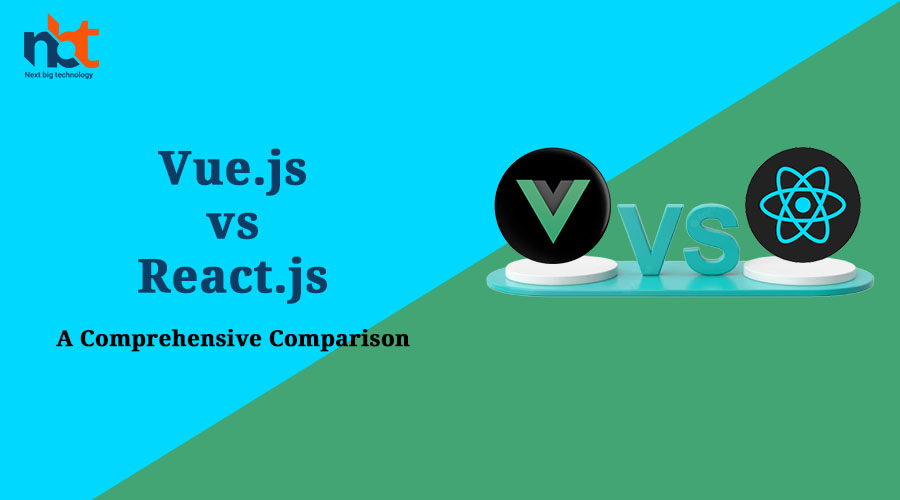Introduction: In the world of web development, choosing the right JavaScript framework is crucial for building robust and scalable applications. Two of the most popular choices among developers are Vue.js and React.js. Both frameworks have gained significant traction and have a thriving community of developers behind them. In this blog, we will compare Vue.js and React.js in various aspects to help you make an informed decision when choosing the right framework for your next project.
- Overview of Vue.js and React.js:
- Vue.js: Vue.js is a progressive JavaScript framework that focuses on building user interfaces. It is known for its simplicity, flexibility, and gentle learning curve. Vue.js allows developers to incrementally adopt its features, making it suitable for both small and large projects. It emphasizes reusability and component-based architecture.
- React.js: React.js, developed by Facebook, is a widely-used JavaScript library for building user interfaces. It employs a component-based approach and a virtual DOM for efficient rendering. React.js is known for its high performance, scalability, and extensive ecosystem. It is particularly popular for developing single-page applications and mobile applications.
- Learning Curve and Developer Experience:
- Vue.js: Vue.js has a gentle learning curve, making it easier for developers to pick up and start building applications quickly. Its syntax is straightforward and resembles HTML templates, allowing developers to write clean and readable code. The official documentation of Vue.js is comprehensive and provides clear explanations and examples.
- React.js: React.js has a steeper learning curve compared to Vue.js, primarily due to its JSX syntax and the concept of managing state and props. JSX combines JavaScript and HTML-like syntax, which can be initially overwhelming for developers. However, once developers grasp the concepts, React.js offers a powerful and flexible framework for building complex applications.
- Performance and Speed:
- Vue.js: Vue.js focuses on optimizing performance by employing a lightweight virtual DOM and smart rendering techniques. It utilizes a diffing algorithm to efficiently update only the necessary parts of the DOM. Vue.js also offers built-in lazy-loading and asynchronous component loading, which can significantly improve application performance.
- React.js: React.js leverages a virtual DOM, which allows for efficient updates and rendering of components. The virtual DOM compares the current state of the UI with the desired state and updates only the necessary elements. React.js also provides tools like memoization and code splitting for further performance optimizations.
- Ecosystem and Community Support:
- Vue.js: Vue.js has a growing and vibrant community of developers. Although its ecosystem is not as extensive as React.js, it still offers a wide range of plugins, libraries, and tools for different use cases. The Vue.js ecosystem is known for its simplicity and ease of integration with existing projects.
- React.js: React.js boasts a vast and robust ecosystem with a wide variety of libraries, tools, and frameworks. It has excellent community support and a wealth of resources available, including official documentation, tutorials, and online communities. The popularity of React.js ensures a rich ecosystem with numerous third-party packages and integrations.
- Scalability and Large-Scale Projects:
- Vue.js: Vue.js is well-suited for small to medium-sized projects and can be easily integrated into existing projects. Its component-based architecture and clear separation of concerns make it manageable and scalable. However, when it comes to large-scale projects with complex state management and extensive team collaboration, Vue.js might require additional libraries or patterns to handle the complexity.
- React.js: React.js excels in building large-scale applications, especially when combined with additional libraries like Redux or MobX for managing state. Its component-based architecture and unidirectional data flow make it easier to reason about and maintain complex applications. React.js also provides tools like React Router for handling routing and React Context for sharing state across components.
- Developer Tools and Debugging:
- Vue.js: Vue.js offers a comprehensive set of developer tools, including Vue Devtools, which allows developers to inspect and debug Vue.js applications in the browser. The tools provide real-time component inspection, performance profiling, and time-travel debugging. These tools greatly assist in developing and optimizing Vue.js applications.
- React.js: React.js also provides useful developer tools, such as React Developer Tools, which enable inspecting and manipulating the component hierarchy. React Developer Tools offer features like component highlighting, props inspection, and time-travel debugging. Additionally, React.js integrates well with popular browser extensions like Redux DevTools for state management debugging.
- Integration and Compatibility:
- Vue.js: Vue.js can be easily integrated into existing projects and coexist with other JavaScript libraries or frameworks. It provides various methods of integration, including using a script tag, importing as a module, or building with a bundler. Vue.js can be gradually adopted within an application, allowing developers to start small and scale up as needed.
- React.js: React.js is highly flexible and can be integrated into different environments, including existing projects. It can be used alongside other libraries and frameworks, such as Angular or Vue.js, through libraries like React-Angular or React-Vue. React.js also supports server-side rendering, which enables improved performance and SEO optimization.
Conclusion: Choosing between Vue.js and React.js ultimately depends on your project requirements, team expertise, and personal preferences. Vue.js offers simplicity, a gentle learning curve, and excellent performance optimization. It is well-suited for small to medium-sized projects and rapid development. React.js, on the other hand, provides a powerful and scalable framework with a vast ecosystem, making it ideal for large-scale applications and complex UIs. Consider the specific needs of your project, evaluate the strengths and weaknesses of each framework, and leverage the vibrant communities surrounding Vue.js and React.js to ensure success in your web development endeavors.










